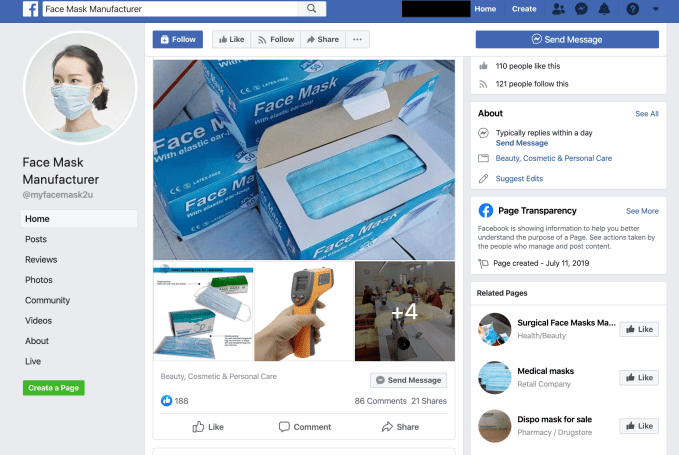Ads for face masks are still appearing on Facebook, Instagram and Google, according to a review of the platforms carried out by the Tech Transparency Project (TTP). This despite pledges by the platforms that they would stamp out ads which seek to profit from the coronavirus pandemic.
Facebook said on March 6 that it would temporarily ban commerce listings and advertisements for medical face masks, in an effort to combat price-gouging and misinformation during the COVID-19 crisis.
Google followed suit a few days later, saying it would temporarily ban all medical face mask ads “out of an abundance of caution”.
The risk of online misinformation exacerbating a global public health crisis has been front of mind for policymakers in many Western markets. Meanwhile front line medical staff continue to face shortages of vital personal protective equipment, such as N95 masks, as they battle rising rates of infection.
There has also been concern that online sellers are attempting to cash in on a public health crisis by price gouging and/or targeting Internet users with ads for substandard masks.
Early last week two democrat senators urged the US’ FTC to act, blasting Google for continuing to allow ads for face masks to be shown to Internet users.
A week later and ads are still circulating.
The TTP — a research project by the nonprofit Campaign for Accountability, a group which focuses on exposing misconduct and malfeasance in public life — reported finding web users still being targeted with face mask ads on Google this week.
It also conducted a review of Facebook and Instagram, and was able to find more than 130 pages on Facebook listing masks for sale, including some using the platform’s ecommerce tools.
“One Facebook Page called ‘CoronaVirus Mask’ offers a ‘respiratory mask collection,’ with prices ranging from $32 to $37, and uses Facebook’s ‘Shop’ feature to display its merchandise and allow people to add purchases to their cart,” it writes in a blog post. “Facebook’s ‘check out on website’ button then directs users to complete the purchase on the seller’s website.”
“Facebook pages that use WhatsApp to establish contact with buyers are employing a tactic commonly used by wildlife and other traffickers, who often display goods on Facebook and then arrange the actual purchase through WhatsApp encrypted messages. The Facebook Page ‘Surgical Face Mask For Sale,’ for example, has a video showing boxes of medical masks and the seller’s WhatsApp number scrawled on a piece of paper,” it added.
“A visit to one of these Facebook pages often triggers recommendations for other pages selling face masks, a sign that the platform’s algorithms are actually amplifying the reach of these sketchy sellers. TTP, without logging into Facebook, went to the page for ‘Corona Mask Shop’ and was served up ‘Related Pages’ for ‘Corona Mask 247’ and ‘Corona MASK on sale.'”
TechCrunch conducted our own searches on Facebook today and while some obvious search terms returned no results a little tweaking of keywords choice and we were quickly able to find additional pages hawking face masks — such as the below example grabbed from a Facebook page calling itself ‘Face Mask Manufacturer’.
From this page Facebook’s algorithm then recommended more pages — with names like ‘Medical Masks’ and ‘Dispo mask for sale’ — which also appeared to be selling masks.

The TTP’s review also found mask ads circulating on Facebook-owned Instagram.
“One Instagram account for @coronavsmask reads, ‘Act now before it’s too late! GET your N95 Respiratory Face Mask NOW!’ It only has a single post but already counts over 6,300 followers,” it wrote. “An account created on March 14 called @handsanitizers_and_coronamask includes over a dozen posts offering such products.”
It also found “several” Instagram accounts that sell drugs had begun to incorporate medical face masks into their offerings.
At the time of writing Facebook had not responded to our request for comment on the findings.
In further searches the group was reproduced examples of Google’s third party advertising display network serving ads for face masks alongside news stories related to the coronavirus — an issue highlighted by Sen. Mark Warner in a tweet last week when he blasted the company for “still running ads for facemasks and other coronavirus scams”.
“The Facebook mask pages were searched and collected on March 17-18 using the terms “corona mask,” “N95,” and “surgical mask” in Facebook’s search function,” a TTP spokesman told us when asked for more info about its review. “Of the more than 130 pages identified, 43 were created in the month of March, more than a dozen of those just days before TTP ran the searches.”
“We don’t have the same level of data from Instagram/Google. Instagram’s search function does not lend itself to the same search ability; it doesn’t bring up a list of accounts based on a single term like Facebook’s search function does. With Google, our goal was to show examples of Google-served ads; those were identified in news stories on March 18,” he added.
We reached out to Google for comment on the findings and a spokesman told us the company has a dedicated task force that has removed “millions” of ads in the past week alone — which he said jad already led to a sharp decrease in face mask ads. But Google said “opportunistic advertisers” had been trying to run “an unprecedented number” of these ads on its platforms.
Here’s Google’s statement:
Since January, we’ve blocked ads for products that aim to capitalise on coronavirus, including a temporary ban on face mask ads. In the past few weeks, we’ve seen opportunistic advertisers try to run an unprecedented number of these ads on our platforms. We have a dedicated task force working to combat this issue and have removed millions of ads in the past week alone. We’re monitoring the situation closely and continue to make real-time adjustments to protect our users.
Google declined to specify how many people it has working to identify and remove mask ads, saying only that the taskforce is made up of members from its product, engineering, enforcement and policy teams — and that it’s been set up with coverage across time zones.
It also said the examples highlighted by TTP are already over a week old and do not reflect the impact of its newest enforcement measures.
The company told us it’s analysing both ad content and how they’re served to enhance its takedown capacity.






